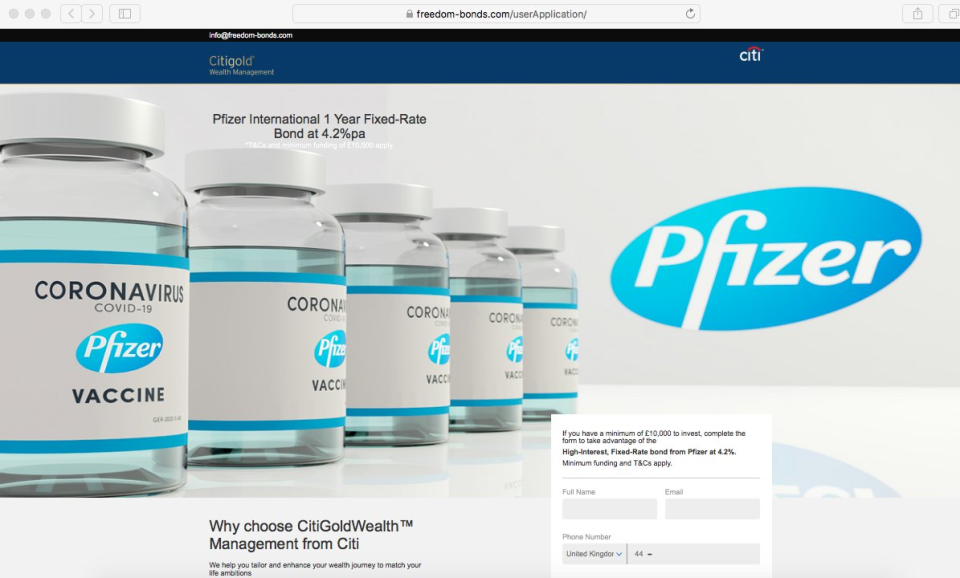Scammers target savers with fake Covid-19 ‘vaccine bonds’, claiming they are backed by Pfizer

Pfizer confirmed that it had no links to the site which is using the company’s name to try to convince savers to hand over their money
(.)Scammers are exploiting the coronavirus pandemic by targeting savers with online adverts claiming their money will be invested in Covid-19 "vaccine bonds".
The adverts emailed to potential victims falsely claim that US bank Citigroup will invest their money in drug company Pfizer, which manufactures one of the three coronavirus vaccines approved for use in the UK.
Investors are persuaded to hand over personal data including their telephone number and to upload copy of their passport or driving licence for "anti-money laundering" purposes.
The one-year fixed-rate bonds promise a return of 4.2 per cent for people with a minimum of £10,000 to invest.
Pfizer confirmed that it had no links to the bonds and warned consumers to be wary of various scams which have attempted to use the company's name.
“We are aware of the Pfizer name being used as part of online scams, including the sale of fraudulent investments and counterfeit Covid-19 vaccines and we take this very seriously," a spokesperson said.
"We are committed to tackling such scams and to reduce the risk of counterfeiting - we track trends very carefully and have processes in place to identify threats to the legitimate supply chain.
The company added that it was "working closely" with government officials, ministries of health, law enforcement agencies, customs and regulatory bodies around the world to address the problem.
Consumer campaigner Mark Taber said the Pfizer advert was one of many in recent weeks that have used the names of well-known companies including Aviva and British Airways to try to tempt unwitting victims.
Emails are typically sent out to people who have searched for investments on Google and inputted their details to one of hundreds of fake comparison sites.
"They promise guaranteed returns and ask you to put in your details. They don't give you what they promised but they've then got you on their list for email and telephone marketing.
"The National Crime Agency could get Pfizer bonds this site taken down right now if they wanted to but they are not interested. You can't get the Financial Conduct Authority to do anything either."
Mr Taber has provided the FCA with details of more than 600 scams advertising high-interest investments via Google Ads.
The regulator was heavily criticised last month over its poor regulation of the investment market.
Former Court of Appeal judge, Dame Elizabeth Gloster, found that the FCA had failed to act on multiple allegations of fraud and misconduct about investment firm London Capital & Finance, which collapsed with £237m of savers' money.
Mr Taber is calling on the FCA to use its powers to prosecute scammers who are guilty of issuing fraudulent financial promotions, which is a criminal offence with a maximum sentence of two years in prison.
He also wants the government to give regulators further powers similar to their US counterparts which can bring prosecutions for wire fraud that have far tougher maximum sentences.
"In the UK it is a risk free game for people who commit investment fraud," he said.
Google did not respond to requests for comment.
Read More
Fake text messages ask for bank details in exchange for Covid vaccine

 Yahoo Finance
Yahoo Finance 